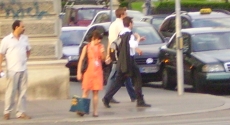Austria behaviour guidelines
Etiquette has always been a big deal in Austria, especially among the upper-class. Some people care more about manners than others, but social expectations still play a role in the lifestyle of 21st century Austrians. If you are able to speak German, you're expected to understand and follow Austrian etiquette customs, which means use good manners.
Shaking hands and looking people in the eye are expected when you are introduced for the first time. Kissing a lady's hand is still practiced in Vienna, but is not expected. Kissing the hand is only done when the hand is presented, and the lips never actually touch the hand. A handshake is the best way to greet the locals. Frau is used to address ladies and Herr is the correct term for men. If you are approaching people you may use "du" for "you" in a casual sense and "Sie" for "you" in a formal sense. There are over 800 titles in Austria, even a master is referred to as Herr Magister or Frau Doktor. "Servus" is casually used for "hello" and "goodbye" and "Grüß Gott" (to be pronounced somewhat similar to "gruiss gott") is used formally for "hello" and "goodbye". "Danke" is used for "thanks" and "Bitte" means please. Of course "Auf Wiedersehen" is the formal way to say goodbye. Please don't forget using these phrases, even when you only ask for your way to a certain place - otherwise you risk to be purposedly misguided!
It is current practice, even among young people, to hold the door open for ladies and to help them put on their coats. Also, it is considered impolite to stay seated at a table when a lady stands up. In public transportation, gentlemen don't anymore need to leave their seats to young and healthy women (as they needed to until some years ago!), but it is expected that you let elderly people, pregnant women and parents with babies sit if you can.
Punctuality is important, so call your host if you think you will be 5 to 15 minutes late for any engagement. Service charges are added to taxi fares, restaurant bills and other services. Bills are usually rounded up, so if your bill is 13.60 Euros the payment would be 14 Euros, or even 15 Euros if you are very content with the service. How much impact this little extra has on your travel budget depends on the money exchange rate you got. However, receiving a tip is never considered an offence, but if somebody refuses to accept a tip you want to give, it is probably because they are mad at you and want to let you know.
More tips by GuidedToursAT
To get more tips about important issues when planning a holiday in Austria, please have a look at our useful tips section. To learn more about money exchange strategies and currency trading, you might wish to read the article about exchanging money in Austria. Should you have any other questions, feel free to ask at anytime!




